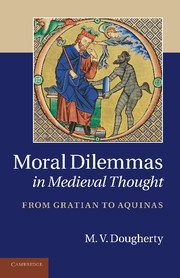Book contents
- Frontmatter
- Contents
- Preface
- Introduction
- 1 Gratian and his glossators on conflicts in the natural law
- 2 Twenty moral dilemmas from two early thirteenth-century summaries of theology: William of Auxerre's Summa aurea and the Franciscan Summa Halesiana
- 3 Raymond Lull and moral ensnarement in the Vita coaetanea
- 4 Thomas Aquinas, moral dilemmas, and a missing article from Quodlibet XII
- 5 Thomas Aquinas on failures of practical reasoning: Why synderesis doesn't inoculate agents against malformed conscience dilemmas
- 6 Moral dilemmas in the early Thomistic tradition: Johannes Capreolus and the Deceiving Demon Dilemma
- Conclusion
- Bibliography
- Index
2 - Twenty moral dilemmas from two early thirteenth-century summaries of theology: William of Auxerre's Summa aurea and the Franciscan Summa Halesiana
Published online by Cambridge University Press: 03 May 2011
- Frontmatter
- Contents
- Preface
- Introduction
- 1 Gratian and his glossators on conflicts in the natural law
- 2 Twenty moral dilemmas from two early thirteenth-century summaries of theology: William of Auxerre's Summa aurea and the Franciscan Summa Halesiana
- 3 Raymond Lull and moral ensnarement in the Vita coaetanea
- 4 Thomas Aquinas, moral dilemmas, and a missing article from Quodlibet XII
- 5 Thomas Aquinas on failures of practical reasoning: Why synderesis doesn't inoculate agents against malformed conscience dilemmas
- 6 Moral dilemmas in the early Thomistic tradition: Johannes Capreolus and the Deceiving Demon Dilemma
- Conclusion
- Bibliography
- Index
Summary
The detailed remarks concerning moral perplexitas offered by the twelfth- and thirteenth-century commentators of the Glossa ordinaria on Gratian's Decretum should not suggest that the field of canon law was the primary locus for theoretical consideration of moral dilemmas in the Middle Ages. While canon law was the earliest discipline to regularize discussion of moral dilemmas among its practitioners, largely because of the subject's inclusion in Gratian's influential textbook, a parallel situation occurred among practitioners of theology in the thirteenth century for two reasons. First, the appearance of formal treatments of perplexitas within some early influential summae theologiae or “summaries of theology” insured that students of the period would consider the subject. Secondly, the gradual adoption of the university practice of commenting on Peter Lombard's Sententiae also helped, as Lombard's discussion of conscience in the second book of that work became the standard occasion for considering cases of perplexitas involving erroneously formed consciences. While Lombard himself didn't use the term perplexitas in that discussion, many of his commentators did, including such major figures as Thomas Aquinas, Bonaventure of Bagnoregio (1217–74), and John Duns Scotus (1266–1308). This increase of interest in perplexitas, particularly among Parisian theologians of the thirteenth and early fourteenth centuries, was not of course without precedent. The previous chapter examined Gregory the Great's attention to the subject several centuries earlier in his Moralia in Job, a text that was quite influential for Gratian.
- Type
- Chapter
- Information
- Moral Dilemmas in Medieval ThoughtFrom Gratian to Aquinas, pp. 41 - 84Publisher: Cambridge University PressPrint publication year: 2011



